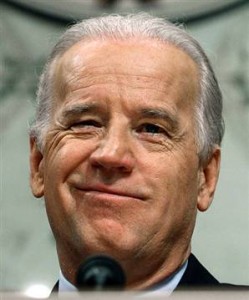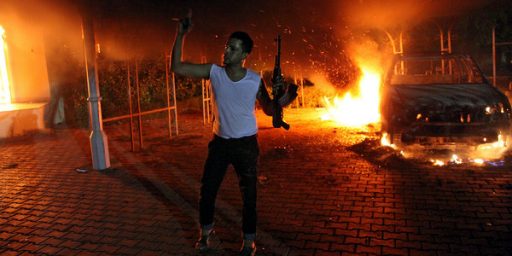Biden: ‘Bad Guys’ Live in Afghanistan
 Dean Barnett wins my Head Scratcher of the Day award for this:
Dean Barnett wins my Head Scratcher of the Day award for this:
If we had a “Most Offensive Quote of the Day” every day, Joe Biden would probably come to own the prize. But even by the senator’s lofty standards of chronic obtuseness, he outdid himself this afternoon: “If John (McCain) wants to know where the bad guys live, come back with me to Afghanistan. We know where they reside. And it’s not in Iraq.”
There’s nothing even mildly offensive, or even obtuse, about this. Barnett goes on a harangue about how this is insulting to American troops fighting in Iraq, who are facing “bad guys” every day. But that’s just plain silly. Biden’s fully aware of what’s going on there and certainly isn’t dishonoring their service. His son, Captain Beau Biden, is an Operation Iraqi Freedom veteran, after all.
The “bad guys” Biden is talking about are Osama bin Laden and Al Qaeda Central. As even our military leaders have told us, Al Qaeda in Iraq is all but finished.
Of course, as AllahPundit points out, by that definition, the “bad guys” don’t live in Afghanistan either. (Hint: They’re probably in another ‘Stan nominally governed by the American ally next door.) Further, he correctly notes, “some of the bad guys have been known to turn up in Iraq from time to time.”
Warren Street, writing for a blog that desperately needs a name change, figures that there are “bad guys” all over and that we’re selective about which ones we should go after. Which, of course, is true.
Were American troops not presently in Iraq, we surely wouldn’t send them into the existing mess now to deal with the “bad guys” we’re currently fighting. But the fact of the matter is that we are there now and the mess is largely one of our own making. Withdrawing from it to take on other sets of “bad guys” would have profound consequences.






I didn’t see anything particularly offensive in Sen. Biden’s statements, either, but I do think that they undercut the claim that America pulled together, briefly, after 9/11.
On September 20, 2001, just a week after the attacks, President Bush made a speech characterizing the enemy we faced as terrorist groups “of global reach” and their supporters. It’s become increasingly obvious over the years that a substantial number of people in the country, apparently including Sen. Biden, disagreed fundamentally with that characterization but, for reasons of their own, chose not to dissent from the president’s stated objectives however much they disagreed with them. No pulling together; just silent disagreement.
In this view the “bad guys” are only Al Qaeda and, indeed, only the Al Qaeda members directly involved in the attacks against us or indirectly in the planning, coordination, etc. of the attacks.
Hmmm.
Does anyone doubt that if we were to pull out of Iraq immediately, before Iraq has time to get it’s own act together, that the Islamic nutjobs wouldn’t be rushing back toward Iraq?
I don’t have any idea what they’d do, Bithead. The prevailing narrative among the withdrawalniks seems to be that Iraq’s Shi’a and Sunni Arabs would oppose such a re-entry successfully.
All the “clever” blog names have been taken, you know.
Heh. Actually, the name’s clever enough. It’s just rather gender specific and I’ve never met a girl named “Warren.”
I don’t think it’s offensive but it does seem short sited (which is a shocker). Why did he omit Pakistan (the hive)?, Phillipines?, Africa??. Until we can go into the tribal region of Pakistan or until Pakistan clears it of “bad guys” then the war in Afghanistan is going to be like a tennis match.
There needs to be a daily dose of outrage, otherwise traffic and the prevailing narrative that ANYONE WHO DISAGREES WITH ME AND THE GOP HATES AMERICA suffers. It is the raison d’être for many blogs.
It really does not matter if it is outrageous or not, but whether one can work oneself into an outrage. For what it is worth, left-leaning bloggers are just as good at this game, as the cartoon nonsense of the past few days shows us.
BTW- I have found that hovering between sheer cynicism and outright disgust is much easier, and leaves me less likely to be let down. Perpetual outrage is exhausting.
Bithead, again, I agree with you. AQ probably would try to execute a spectacular attack to reignite violence. This will most likely happen whether we pull out immediately, or if we pull out years from now. Because these foreseeable actions are not dependent on the time horizon, such a hypothetical is not relevant to the question of the timing of our inevitable withdrawal.
Note that this again gets back to our dialogue yesterday of the “whack a mole” approach to fighting terrorism versus an “address the root cause” approach.
I’m not sure that’s a fair characterization. The question seems to be what are the root causes? There are several candidates: poverty, Islam, and unfree societies.
My own view is that, ultimately, our best grand strategy is to pursue the Whig agenda we’ve pursued over the last 150 years or so which has both economic liberalization and political liberalization components.
Yup. I’ve even created a mock “Outrage of the Day” tag for these stories.
At the center of all of them…(I note with some irony) is radicalized Islam.
I agree with Dave on this one.
I think there is a disconnect over who the bad guys are and even where they live.
My reaction to Barnett’s assessment mirrors James’–whatever Biden’s statement is, it certainly isn’t “offensive” (let alone “most offensive” thing that has been said of late).
And John’s right: one wonders how these guys maintain their outrage without collapsing in exhaustion.
I agree for the most part, but I’d argue that more specifically THE cause to focus on is the I/P issue. I think the things you mention lay the foundation for hatred to potentially develop, but the I/P issue, combined with religious collectivism, provides the spark, so to speak.
Adressing that issue, as well as encouraging American independence from oil (thereby allowing the US to distance itself from Arab despots, whom are viewed as un-Islamic), I believe will do more to resolve the problem of terrorism in comparison to more general goals of reducing poverty/tyranny.
Though we may disagree on our most important root causes above, are we in agreement that an indefinite “whack-a-mole” approach is not sufficient and should not be the sole focus of debate between the candidates and the blogosphere?
Sure. I don’t know that anybody’s ever claimed that Afghanistan was anything but, as you say, “whack-a-mole”. Iraq was initially framed as something more although that seems to have fallen by the wayside. Remember “Iraq the Model”?
My own view is that a lot of selling will need to be done to get the American people to go along with anything other than increasingly violent “whack-a-mole”. I don’t see any political support from either side of the aisle for significantly increased engagement with the Middle East/Southwest Asia.
Specifically, I don’t see a wave of support to remove our military from Iraq and replace them with significant numbers of diplomats and developers, what Tom Barnett calls a “Sys Admin force”.
I would suggest that Bush’s initial statement as I allowed the other day, amounted to laying all this out as a war of attrition.
In the short term, it amounts to ‘whack a mole”. but in the longer term, the bad guys are losing a lot of assets…. and even in the terrorism mode they’ve set themselves, they can’t last forever.
Where the warlords in Iraq will cheerfully slit their throats…
We might want to add western support for said unfree societies for political and economic gain and lack of respect for the culture and religion in the middle east to the list…
And of course these can be depended upon not to fight for said nutjobs, as they ahve in the past?
Your leaving out that point is verrrry reassuring.
You mean when the old maxim “the enemy of my enemy is my friend” kicked in because they were fighting against the US? Yes folks, we were the very cause of this alliance. Once we are gone, so will it be. At least, this is how I see it…
My guess is that the unity was real. It’s just that over time, with the perceived risk of a terrorist attack greatly lowered, it’s easy to change views for either political purposes or new information. The towers falling had a profound impact on virtually all Americans. The unthinkable happened and we had no idea what was next. I remember feeling anxiety about turning on the TV in the morning for a couple of months after 9/11. Given the lack of knowledge of the enemy we faced, a broad approach seemed reasonable. Personally my views haven’t changed.
When we invaded Iraq public support was around 80%, despite American casualty estimates of 3 to 8k from the initial invasion. Americans were willing to handle the costs at the time do to the perceived risks. As that perception changed, ironically in part do to American success in Iraq, Americans no longer felt the price was worth it. Little is ever said of how things would be today if Saddam was still in power. It would all be speculative of course, but the range it seems would be between bad and horrible.
Bit, this all assumes that we can kill the terrorists faster than new ones are created. I would argue that for every terrorist killed, the continuation of violence, further entrenchment of each side’s cause, and the unavoidable collateral damage would create > 1 new terrorist(s).
Since the rate created is greater than the rate destroyed, at steady-state, the “whack a mole” approach is untenable. Efforts must be taken to reduce the “creation rate” of said terrorists–you can’t just “kill harder” with your eyes closed and somehow expect that to magically result in victory.
Were that the case, Iraq would still be under their control.
Now you’re starting to contradict your original premise that this is a global fight, and that one can’t independently analyze Iraq and Afghanistan. As you put it, “Iraq is just a battle…in the [larger] war.”
We are seeing an uptick in violence in Afghanistan coinciding with the lull in Iraq, sort of like a balloon that gets pushed in at one point, and bulges in another. You can’t look at that one depressed region of the balloon and say “look, I made the balloon smaller.”
duckspeaker,
I think Iraq has done terrible things to bin Ladenism. bin Laden said that once the U.S. got its nose bloodied it would leave. It didn’t happen that way. Al Qaeda declared Iraq to be its central front and they are the ones leaving. That can’t be good for recruiting.
Further, the horrendous acts perpetrated on fellow Muslims by Al Qaeda created a considerable number of counter-terrorists in the native population. I also suspect that a large number of Iraqis now have a reasonably favorable view of Americans.
Analysis of human intel can be like that. In this case, the contradiction is not nearly as deep as it seems; Have we seen large numbers of such people moving over the Afghan border? No, we saw a group of about 40, all of whom died in the attack. This represents a very small portion of the number of people involved in attacks on us in Iraq, proper.